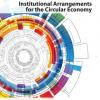News
Displaying Results 1 - 12 of 12
Addressing ministers at the 2024 International Transport Forum Summit (ITF24) in Leipzig, UNECE Executive Secretary Tatiana Molcean recalled that 152 United Nations Member States are contracting parties to at least one of the 61 transport conventions hosted by UNECE. These legal instruments help to…
Extreme weather events exacerbated by climate change increasingly threaten the ability of countries worldwide, including those in the UNECE region, to sustain safe, reliable, and equitable transport and mobility.
Adapting to future impacts of climate change is therefore no longer a concern to be…
The transport sector is responsible for 23% of global greenhouse gas emissions, with road transport accounting for around 77% of these emissions. As populations, economies, and the need for mobility grow, the World Bank estimates that greenhouse gas (GHG) emissions from transport could increase by…
In a rapidly evolving world, grappling with climate change and the triple planetary crisis, transformative innovation stands as a crucial solution to these pressing challenges. Strategic learning is increasingly recognized as a key component in both ecosystem development and the broader realm of…
According to the 2023 Global Circularity Gap Report by the Circle Economy Foundation, transitioning to a circular economy will allow us to fulfil people's needs with only 70% of the materials we currently extract and use. The benefits of the circular economy are tremendous, as it not only addresses…
Decades of unsustainable consumption and production patterns have resulted in the exhaustion of finite resources and environmental degradation. As governments reassess scenarios, the circular economy model - where resources are reused, recycled, and repurposed to reduce waste - has become a pillar…
The transition from linear to circular economies requires fundamental rethinking of trade policies and regulations. “Harmonized System” codes (HS codes) are a key pillar of the tariff infrastructure for international trade. These HS codes were designed at a time when circular economy considerations…
June 2022 has been the month of trade discussions in Geneva, first with the World Trade Organization’s (WTO) 12th Ministerial Conference (MC12) and then UNEC’s Steering Committee on Trade Capacity and Standards (SCTCS). Both looked in detail at responses to the ongoing impact of COVID-19, both…
UNECE is supporting the Government of Moldova in its efforts to enhance its national innovation system to accelerate progress towards Sustainable Development. During the online meeting on 16 June, the two sides agreed to develop a Roadmap for Innovation and Technology Transfer, which will feed into…
A circular economy is a paradigm which can contribute to reducing the economic, environmental and social costs of resource use, while at the same time strengthening economic competitiveness, reducing poverty, and providing better quality of life, in line with the United Nations 2030 Agenda for…
Risk is a part of our everyday lives. When we wear a helmet to ride a bike, for example, we accept a small inconvenience to reduce the risk of a fall or an accident. When a homeowner decides to retrofit their house, they incur a cost to shield against an earthquake or a flood. Faced with the COVID…
Every year we lose about 14% of the food produced before it is sold, and this does not even include the food never harvested. Even more is wasted at retail and consumer levels. At the same time, over 800 million people worldwide suffer from hunger, while food loss is a major contributor to CO2…











